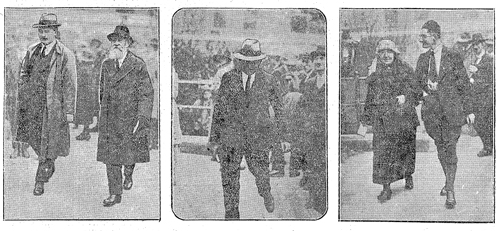Sinn Féin Ard Fheis recommits to securing international recognition for independent republic
Strikes, boycotts and plebiscites among strategies considered to advance case for prisoner releases
Dublin 18 October 1923 - The aim of Sinn Féin is to secure international recognition of Ireland as an independent Republic, was confirmed yesterday at the party’s Ard Fheis in Dublin.
The reiteration of the principle purpose of Sinn Féin came after Dr. Kathleen Lynn moved a resolution to that effect, although it raised an objection from a delegate from Dundrum in co. Dublin, Mr. O’Connor, who felt that Sinn Féin was unfit to carry the republican position. In response to O’Connor’s call for the party to adopt the Republican standard and drop Sinn Féin as a ‘too indefinite’ title, the chairperson of the Ard Fheis, Mary MacSwiney said that a name change could not be accepted and that not only was the Sinn Féin organisation a Republican organisation, but nobody had any business in it but Republicans.
Unsurprisingly, the issue of republican prisoners was to the fore of deliberations and the Ard Fheis endorsed a motion calling for the unconditional release of Mr. Eamon de Valera and all other political prisoners. Various proposals were discussed as to how the prisoners' cause might be advanced. A suggestion that a general strike be called was made, but it was felt that such a course should be left to labour bodies. One delegate also proposed that all amusements, including football etc, should be boycotted until all the prisoners were released. Dispatching deputations to the Labour movement and to the catholic and Protestant archbishops of Dublin was also discussed and agreed. Also agreed was a resolution that a plebiscite be held across Ireland in the event of the prisoners not being released.
As to how prisoners and their families might be supported, Dr. Lynn promoted support for the Republican Prisoners’ Dependant Fund and work it does to alleviate the distress of families. The Fund relies heavily on subscriptions from America, Australia, Great Britain and South Africa, with less than £1,000 coming from Ireland.
A northern delegate urged that the same focus and care given to republican prisoners in the Free State should be given to republican prisoners in the six-counties, the families of which felt neglected. Unless this care was given from Sinn Féin, the delegate indicated that a second organisation in Dublin was needed for the relief of six-county prisoners and their dependants. In other business, a letter was read out to the Ard Fheis from the Dublin I.D.A. inviting delegates to attend a permanent exhibition at 40 Upper O’Connell Street. The letter also mentioned that in view of the urgent need to provide employment, support for Irish manufacturing was more essential than ever.
The Ard Fheis also heard serious criticisms voiced over the attitude of the Catholic Church hierarchy on national questions. Indeed, a resolution of protest was adopted on behalf of the Catholic members which it was decided to forward to the Pope. The resolution had been proposed by the Sean O’Donoghue Club in Cork, the chair of which is Mary MacSwiney TD, who urged that the matter be discussed with calmness and restraint, and in acknowledgement of their rights and position as children of the Church.
Finally, the Ard Fheis continued to discuss the issues around the Anglo-Irish Treaty of December 1921 that had led to the split in the Sinn Féin and the wider republican movement. Not only was the matter of the instructions given to the Plenipotentiaries who went to London to negotiate with the British government raised, so too was the issue of the documents that passed between those plenipotentiaries and their British interlocutors, as well as with their own Cabinet back in Dublin. Count Plunkett, amongst others, claimed that vital documents had been suppressed which indicated the directions which the envoys had received from the cabinet of the Dáil, while Mr. H. O’Hanrahan alleged that letters and documents that had passed between the Republican and British cabinets between June and December 1921 had been kept back from publication and now needed to be immediately released.
[Editor's note: This is an article from Century Ireland, a fortnightly online newspaper, written from the perspective of a journalist 100 years ago, based on news reports of the time.]





















